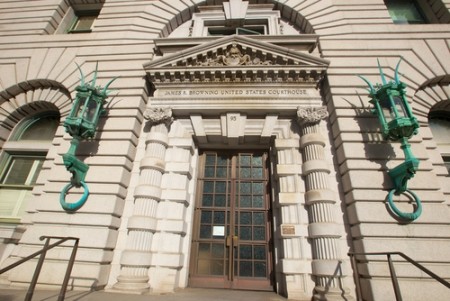9th Circuit rules grandparents exempt from Trump’s travel ban, allows more refugees

The San Francisco-based 9th U.S. Circuit Court of Appeals.
In a ruling issued just 11 days after oral arguments, the 9th U.S. Circuit Court of Appeals has upheld a district court’s limits on restrictions on travel to the U.S. created by President Donald Trump’s travel ban.
The ruling (PDF) in Hawaii v. Trump is not on the legality of the president’s revised executive order; those arguments will be heard by the U.S. Supreme Court on Oct. 10. Rather, the dispute is over the federal government’s implementation of a June 26 Supreme Court ruling saying the president’s executive order should not be enforced against foreign nationals with “a credible claim of a bona fide relationship with a person or entity in the United States.” The state of Hawaii and the Trump administration are litigating the meaning of that statement as to refugee admissions as well as admissions of nationals from the six majority-Muslim nations named in Trump’s order.
“The court’s order clarifies that the government is still enjoined from enforcing the 50,000-person cap … to exclude refugees who have a bona fide relationship with a U.S. person or entity and are otherwise eligible to enter the United States,” the ruling said.
A three-judge panel, writing per curiam, ruled Thursday that Honolulu district court judge Derrick Watson did not go beyond the scope of the Supreme Court’s order when he exempted refugees who have formal help from a U.S.-based refugee resettlement agency, or to grandparents, grandchildren, brothers- and sisters-in-law, aunts, uncles, cousins, nieces and nephews of people in the United States. Those familial relationships, the panel said, are clearly bona fide.
“Stated simply, the Government does not offer a persuasive explanation for why a mother-in-law is clearly a bona fide relationship, in the Supreme Court’s prior reasoning, but a grandparent, grandchild, aunt, uncle, niece, nephew, or cousin is not,” the panel wrote.
Similarly, the panel found that refugees have a bona fide relationship with a U.S. entity if the relationship is “formal, documented, and formed in the ordinary course”—all requirements set out by the Supreme Court’s June order. Unusually, the panel also ordered that because of the very time-sensitive nature of refugee admission, its mandate should issue five days after the opinion was published, rather than the usual period of at least 52 days.
“Refugees’ lives remain in vulnerable limbo during the pendency of the Supreme Court’s stay,” the court said. “Because this case is governed by equitable principles, and because many refugees without the benefit of the injunction are gravely imperiled, we shorten the time for the mandate to issue.”
Watson, the Hawaii judge, ruled after the Supreme Court’s June order that the federal government’s implementing guidelines were “unduly restrictive.” He issued an order exempting refugees and the larger set of relatives. The federal government appealed to both the 9th Circuit and the Supreme Court, and the Supreme Court in July declined to disturb the family relationship part of the ruling, but stayed the refugee portion pending the 9th Circuit’s decision. The appeals court expedited the case at the request of both parties.
The case included input from numerous amici, including Human Rights First, the International Refugee Assistance Project, 15 U.S. states and Washington, D.C., and groups of law professors and former national security officials. However, the 9th Circuit denied a motion to intervene from the U.S. Committee for Immigrants and Refugees.
The Justice Department plans to appeal the ruling to the Supreme Court, the Hill reported.“The Supreme Court has stepped in to correct these lower courts before, and we will now return to the Supreme Court to vindicate the executive branch’s duty to protect the nation,” a Justice spokeswoman told the Hill.
Updated Sept. 8 to alter headline, lede and name of case.



